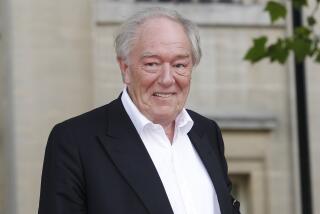Harry Potter and the imagination thief
- Share via
For someone so famous for inspiring the imaginations of her readers, J.K. Rowling now seems determined to cut them off at the pass. In the introductory video for her new interactive website, Pottermore, she makes the announcement that the site will contain “additional information that I’ve been hoarding for years about the world of Harry Potter.”
One of the major draws of the site, still in testing stage, is the opportunity for Rowling fans to learn character histories and trivia about the boy wizard’s magical world. But the idea of Pottermore is chilling for scholars who parse literary works for their deeper meaning — preferably on their own.
This isn’t the first time that Rowling has given her readers “new” information about her famous characters. She has said that she had wanted the epilogue of the last book, “Harry Potter and the Deathly Hallows,” to be vague, leaving out “every bit of information I could.” Yet when Rowling gives interviews or discusses the series, she gives details about what the lives of the characters — major and minor — are like after the story ends. Perhaps most famously, Rowling announced in 2007 that professor Albus Dumbledore, the brilliant Hogwarts headmaster, is gay.
So what’s wrong with a little bit of post-publication background information? For me, it is possibility. As a graduate student of English literature, one of the things I most love about reading, and one of the first things I teach my students, is that you don’t need to know whether Desdemona had sisters or what happened to Lady Macbeth’s child to understand the work in front of you. Everything you need is at your fingertips. Your job as a reader is to use your imagination and analytical skills where the author has left off.
I also have come to embrace the concept of “intentional fallacy” — the idea that what an author means to say isn’t necessarily important to interpreting a literary work. It’s what she does say, and how a reader interprets it, that really matters. Rowling can tell us now what characters go on to do for a living or the significance of wand woods, but if these things aren’t explicated in her books, we’re free to disagree with her and interpret what’s in the text for ourselves.
But Rowling seems determined to be the wellspring of outside-the-text facts about Harry Potter’s world, which cuts off the kind of imagining that is usually left to readers. Some readers might have seen Dumbledore as gay; others might have viewed him as quirky and without a particular sexual identity. Both could be “right,” but with her post-publication pronouncements, Rowling has limited our possibilities. On Pottermore, Rowling may provide an imaginative experience for the site’s visitors, but it’s really her imagination, not her visitors’. This will make readers’ roles more passive and less creative.
But perhaps readers simply need something beyond imagination and analysis: the will to believe in their own reading. I’m reminded of the ghost in “Hamlet,” and how little we really know about him. Is the story he tells Hamlet — that he is the spirit of his murdered father and should be avenged — true? Is he a hellish apparition sent to lure Hamlet to commit an “unnatural murder” of his own? Or is he just a figment of Hamlet’s imagination? No one really knows, and that’s part of the fun. It’s a very different play depending on which view you take.
But what if Shakespeare were able to tell us from the grave that, in fact, Hamlet imagined the whole thing? A lot of what makes the play great would be lost to us, until we remember that we’re the readers, and our perspective is what matters. So who cares what Shakespeare thinks, anyway?
Talya Meyers is pursuing a doctorate in English literature at Stanford University.
More to Read
A cure for the common opinion
Get thought-provoking perspectives with our weekly newsletter.
You may occasionally receive promotional content from the Los Angeles Times.









